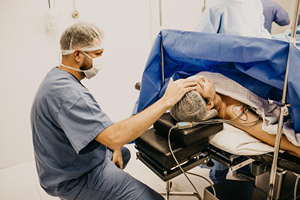Introduction
In today’s complex medical landscape, emergency room malpractice cases often spark heated debates and intense scrutiny. The stakes are high, not just for the healthcare professionals involved, but also for the patients seeking justice for perceived wrongs. One critical component in these trials is the expert witness, a professional who lends their expertise to Moseley Collins Law medical negligence attorney illuminate intricate medical issues that laypersons may struggle to understand. This article will delve into The Role of Expert Witnesses in Emergency Room Malpractice Trials, exploring how they influence outcomes and contribute to the legal process.
Understanding Emergency Room Malpractice
What Constitutes Malpractice in an ER Setting?
Malpractice occurs when a healthcare provider fails to meet the standard of care, resulting in harm to a patient. In an emergency room context, this could involve misdiagnosis, delayed treatment, or surgical errors. But what exactly does "standard of care" mean?
- Standard of Care: It refers to what a reasonably competent provider would do under similar circumstances. Common Causes: Miscommunication, lack of training, fatigue among staff, and system failures can all contribute to malpractice incidents.
The Importance of Expert Witnesses
What is an Expert Witness?
An expert witness is a professional with specialized knowledge who provides testimony regarding particular aspects of a case. They are essential in helping juries understand complicated medical practices and procedures.
- Qualifications: Typically possess advanced degrees and relevant experience. Role: Explain technical details and offer opinions based on their expertise.
Why Are Expert Witnesses Crucial in ER Cases?
When it comes to emergency room malpractice trials, expert witnesses serve various roles:
Clarifying Medical Procedures: They break down complex medical terminologies into understandable concepts. Establishing Standards: They help define what constitutes appropriate care in emergency situations. Providing Credibility: Their testimony can lend significant weight to either side's argument.Types of Expert Witnesses in ER Malpractice Trials
Medical Experts vs. Legal Experts
Not all expert witnesses are created equal. In ER malpractice cases, there are generally two types:
- Medical Experts: These individuals are typically practicing physicians or specialists with firsthand experience in emergency medicine. Legal Experts: They might be former judges or attorneys who specialize in medical malpractice law.
Both types play pivotal roles but from different perspectives.
How Expert Witnesses Are Selected for Trials
The Process of Selecting an Expert Witness
Selecting the right expert witness is crucial for a successful trial outcome. Here are some steps involved:
Identifying Specialty Needs: Determine which area of expertise aligns with the case specifics. Evaluating Credentials: Look into their education, experience, and publications. Assessing Availability: Ensure they can testify during the trial dates.The Role of Expert Witnesses in Emergency Room Malpractice Trials
Expert witnesses act as interpreters between complex medical practices and legal standards; thus, they shape how courts view evidence and arguments presented by both sides.
Testimonial Impact
Their testimonies can directly impact jury perceptions:
- A compelling narrative can humanize the data. Effective communication helps jurors grasp nuanced information that may influence their final decisions.
Challenges Faced by Expert Witnesses
What Challenges Do Expert Witnesses Encounter?
Despite their importance, expert witnesses face numerous challenges:
- Bias Allegations: Critics often claim experts favor one side over another due to financial incentives. Complexity of Testimony: Simplifying intricate medical terms without losing accuracy can be challenging.
The Process of Testifying as an Expert Witness
Steps Taken Before Trial
Before stepping into the courtroom, expert Take a look at the site here witnesses usually engage in several preparatory activities:
Reviewing Case Materials Meeting with Legal Teams Preparing Demonstrative EvidenceThese steps ensure that they present coherent and persuasive arguments during trials.
How Effective Are Expert Testimonies?
Statistical Insights on Outcomes Influenced by Experts
Studies reveal that cases featuring expert testimonies tend to have higher success rates for plaintiffs than those without such insights:
| Outcome | With Expert Testimony | Without Expert Testimony | |---------|---------------------|--------------------------| | Plaintiff Wins | 70% | 30% | | Settlements | 60% | 25% |
This table underscores the power experts wield within legal contexts.
FAQs
1. What qualifications should an expert witness have?
An ideal expert witness should hold advanced degrees relevant to the case at hand and possess significant experience in their field.
2. How much does it cost to hire an expert witness?
Costs vary widely depending on expertise but can range from hundreds to thousands of dollars per hour.
3. Can any physician serve as an expert witness?
While any licensed physician can technically serve as one, most effective experts have specialized knowledge related directly to the case specifics.
4. How are biases managed among expert witnesses?
Attorneys often choose experts based on their reputations for neutrality; however, thorough vetting processes aim to mitigate potential biases.

5. Do juries trust expert testimonies?
Trust varies by individual jurors but well-articulated testimonies from credible sources usually resonate positively with them.
6. Can an expert witness be cross-examined?
Yes! Cross-examination is a vital part of courtroom proceedings designed to challenge the credibility or reliability of testimony provided by experts.
Conclusion
Navigating through emergency room malpractice trials demands not only legal acumen but also a profound understanding of medical complexities—this is where expert witnesses become invaluable assets. Whether elucidating standards of care or demystifying procedures that led to alleged malpractice, these professionals play pivotal roles in shaping trial outcomes and ensuring justice prevails for both parties involved.
In summary, The Role of Expert Witnesses in Emergency Room Malpractice Trials cannot be understated; they bridge gaps between medicine and law while fortifying our judicial system's integrity through informed testimony and reliable evidence-based insights.